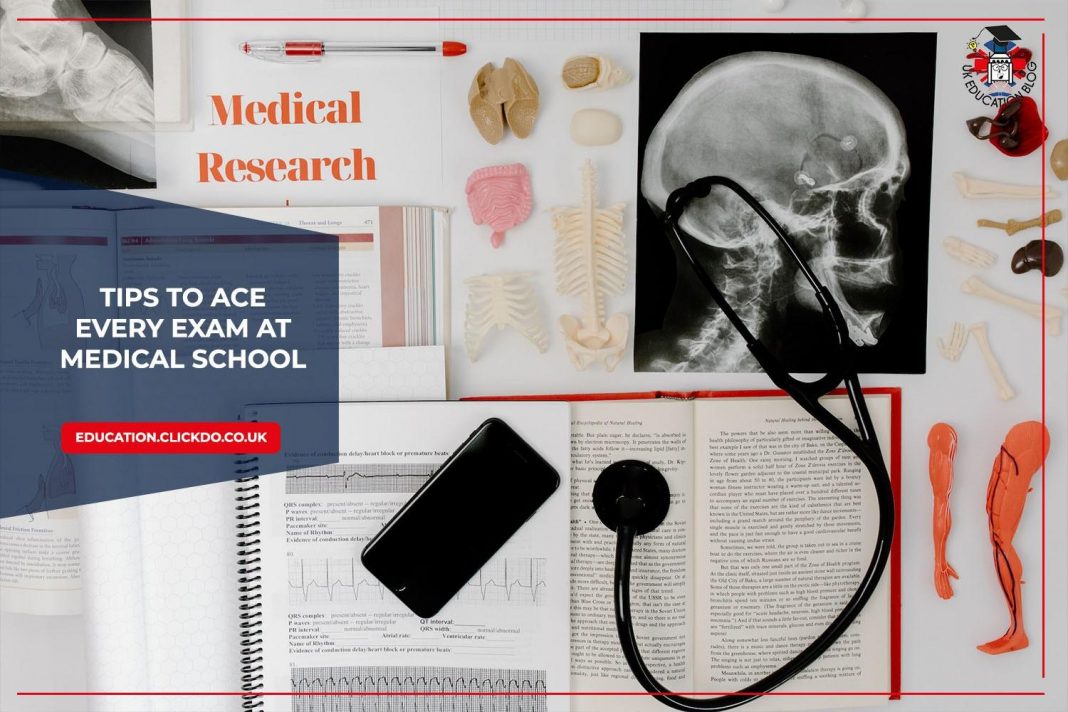We all know exams are stressful, especially at medical school.
The amount of theoretical knowledge that you must remember is enormous.
There is no difference if you study medicine in Europe or the UK. The medicine course curriculum is pretty much the same for all aspiring doctors.
In this post, you will discover tried-and-tested study techniques that will help you memorize any material, save time, and ace every exam at medical school.
1. Find a study friend
 A great way to motivate yourself to study is to find a study friend or even form a study group. This is an incredibly effective strategy for learning since you can help each other better understand a particular topic and review exams material together.
A great way to motivate yourself to study is to find a study friend or even form a study group. This is an incredibly effective strategy for learning since you can help each other better understand a particular topic and review exams material together.
A few great benefits of studying with friends are:
-
Improving notes
Every student has a unique way of writing down lectures. A great way to enhance your information and fill in any gaps is to compare notes with your classmates. This allows everyone to understand any topic better and clear up misconceptions that may arise.
-
Increasing motivation
When you make study appointments with your friends, more or less, you feel obligated to show up. Therefore, this will boost your motivation to study and reduce procrastination.
-
Making studying enjoyable
Let’s be honest; most of us always check out our phones while studying or even working. One way to give up this habit and say “NO” to social media distractions is to study with friends.
A study group might assist you in staying on track. Plus, studying with friends may be enjoyable. You may tell jokes and make up humorous examples.
2. Diversify your study techniques
 Besides taking notes, you can use flashcards and try out different learning techniques and methods to add a variety to your study sessions. By doing so, you will spend your time more productively and efficiently.
Besides taking notes, you can use flashcards and try out different learning techniques and methods to add a variety to your study sessions. By doing so, you will spend your time more productively and efficiently.
Some of the best study techniques for medical and dental students are:
-
SQRRR or SQ3R
Behind the SQRRR acronym are hidden 5 steps that can make your study session more efficient and effective. Each new module may have its own set of difficulties – diagrams, terminology, and charts.
These 5 simple steps will help you make the most out of your limited free time at medical university
-
Survey:
Don’t read the whole lecture/chapter from your book. Start with skimming the material:
- Read all headings and subheadings
- Look at any visual material, such as images and charts
-
Question:
For each paragraph, try formulating questions that will help you remember the material, such as:
- What is the main topic of this chapter?
- What do I already know about it?
The main idea is to improve your active learning rather than passive learning (simply reading and memorizing text). Try turning all headings and subheadings into questions. For instance, if you have to study for an Anatomy class, example questions may include:
- What is a parietal bone?
- What is occipital bone?
- What is sphenoid sinus?
Preparing questions and being the first person to test yourself is way better than simply memorizing the material. The secret of active learning at medical school is asking and answering questions.
-
Read
Yes, you can’t escape from reading. After writing down all questions, you should start looking for the most informative answers. So, reread the whole lecture and search for the information needed.
-
Recite
After reading the whole lecture, try answering the questions from step two. If you can’t, take notes and reread the relevant paragraphs. Try to recite or recall everything you remember as soon as you finish reading and taking notes.
-
Review
The most crucial part that most students skip or leave for the last week before the exam is to review the material.
Don’t forget to review the material the day after completing the previous four steps. You must check your notes to understand the topic entirely. Quiz yourself on the questions you formed on step two.
-
Distributed Practice
Studying in a medical university is like preparing for a marathon. Future doctors gain knowledge not just for one test or exam but also to treat patients and save human lives in the near future. Therefore, we encourage you to try the distributed practice instead of cramming the day before an exam.
Distributed practice refers to studying in multiple short sessions over a more extended period of time, with a reasonable amount of time between each session.
The meaning behind the name of this study method is:
Distributed = spread out
Practice = to perform something repeatedly in order to master it
The number of learning sessions and the optimal gap between them depends on a few factors:
- How much material are you trying to learn?
- What time do you have before the test/exam?
- What is your overall goal?
A simple example for this learning technique is:
- Day 1: You are introduced to the new topic / Lecture in class
- Day 2: Writing down notes and reviewing the whole material
- After 3 days: Review your notes
- After one week: Review
- After two weeks: Review
3. Plan ahead: Create a study schedule
 Most students enjoy trying out the study techniques introduced in the previous paragraph. However, there always comes the question: “How to implement them in our life?”.
Most students enjoy trying out the study techniques introduced in the previous paragraph. However, there always comes the question: “How to implement them in our life?”.
The secret is to start planning and creating a study schedule that will help you keep track of your studies, university assignments’ deadlines, and free time for your hobbies and friends.
Good time management ensures that you study better, reduce stress, and increase efficiency. It is crucial to remember that a study schedule is there not to pressure you but to support your goals and help you achieve them smarter, not harder.
Therefore, when you start forming your study schedule, make sure to include daily activities such as cooking, going to the gym, coffee with friends, or whatever makes you happy.
A few simple steps that we advise you to use when planning ahead are:
- Write down all important deadlines such as dates for exams and tests
- List all subjects that you have to study for
- Choose the best study technique for you
- Figure out your free time after classes
- Create a balance between personal and academic life by blocking time for your hobbies, family, friends, and simply to rest
- Fill in your study sessions based on what free time you have left and the techniques you have chosen
4. Discover the best note-taking technique for you
 A couple of times, we have mentioned the importance of taking notes. There is no right or wrong note-taking technique. However, you should find the best one for you to maximize the benefits of writing down study material.
A couple of times, we have mentioned the importance of taking notes. There is no right or wrong note-taking technique. However, you should find the best one for you to maximize the benefits of writing down study material.
We advise you to never copy text straight out of books. Because copying text from a textbook does not activate the brain, the learner will not comprehend the content and may fail to recall the subject.
A few tips and tricks that you can try out and implement are
-
Use abbreviations
Sometimes professors speak too fast, or simply the material is too much, and you just can’t keep up. So, why don’t you develop a system of abbreviations to speed up your writing?
Some of the most common abbreviations include:
- Tx – treatment
- Dx – diagnosis
- Sx – symptoms
- Rx – prescription
- Sx – surgery
- Thx – therapy
- HR – Heart Rate
- BP – Blood Pressure
- d/t – due to
- s/t – secondary to
- r/t – related to
- s/p – status post
-
Colour code your notes
A powerful way to remember information better is to use different colours and highlight important parts. Choose 3 to 4 colours and create your own colour code system.
Use the same colours throughout your notes to represent the same types of information, whether it’s yellow for primary ideas, green for facts, or red for definitions. To minimise confusion, try to utilise the same system for all of your classes. You can use this note-taking technique for both electronic and handwritten notes.
5. Stop multitasking during study sessions
 Hundreds of students have problems focusing while studying because of the many distractions we have in our lives. Just checking for new messages or liking a few pictures on Instagram has a more significant negative impact on studies than we can imagine.
Hundreds of students have problems focusing while studying because of the many distractions we have in our lives. Just checking for new messages or liking a few pictures on Instagram has a more significant negative impact on studies than we can imagine.
The negative effect of multitasking during learning sessions include:
- Remembering less
- Making mistakes
- Longer study sessions
Break the multitasking habit with these simple tips:
- Put away your phone when you sit down to read for your classes
- Turn off the TV if you get easily distracted by noises
- Try to stick to your study schedule
- Organize your study area
You can also try using time management apps designed to help students efficiently organize their day-to-day tasks and stay focused while studying.
Final words
Nobody likes to spend more time studying than is necessary, especially with all the additional pressures medical training entails. Learning good study strategies will guarantee that you are adequately prepared for your medical tests and exams. Hopefully, using the tips outlined above, you will be able to make your study time more productive and enjoyable.
Author Profile

- Shirley Owen is a blogger and writer who enjoys writing blogs on education, technology and general news. An avid reader, she follows all the latest news & developments to report on them through her articles.
Latest entries
 language learningJune 18, 2025From Beginner to Fluent: Your 6-Month English Learning Plan
language learningJune 18, 2025From Beginner to Fluent: Your 6-Month English Learning Plan early learningMay 16, 2025Boosting Young Brains: The Power of Puzzles in Child Development Explained
early learningMay 16, 2025Boosting Young Brains: The Power of Puzzles in Child Development Explained ExamsMay 1, 2025Mastering A-Level Economics: A Strategic Guide to Academic Excellence
ExamsMay 1, 2025Mastering A-Level Economics: A Strategic Guide to Academic Excellence student lifeApril 24, 202512 Best Study Spots in Liverpool Revealed
student lifeApril 24, 202512 Best Study Spots in Liverpool Revealed







